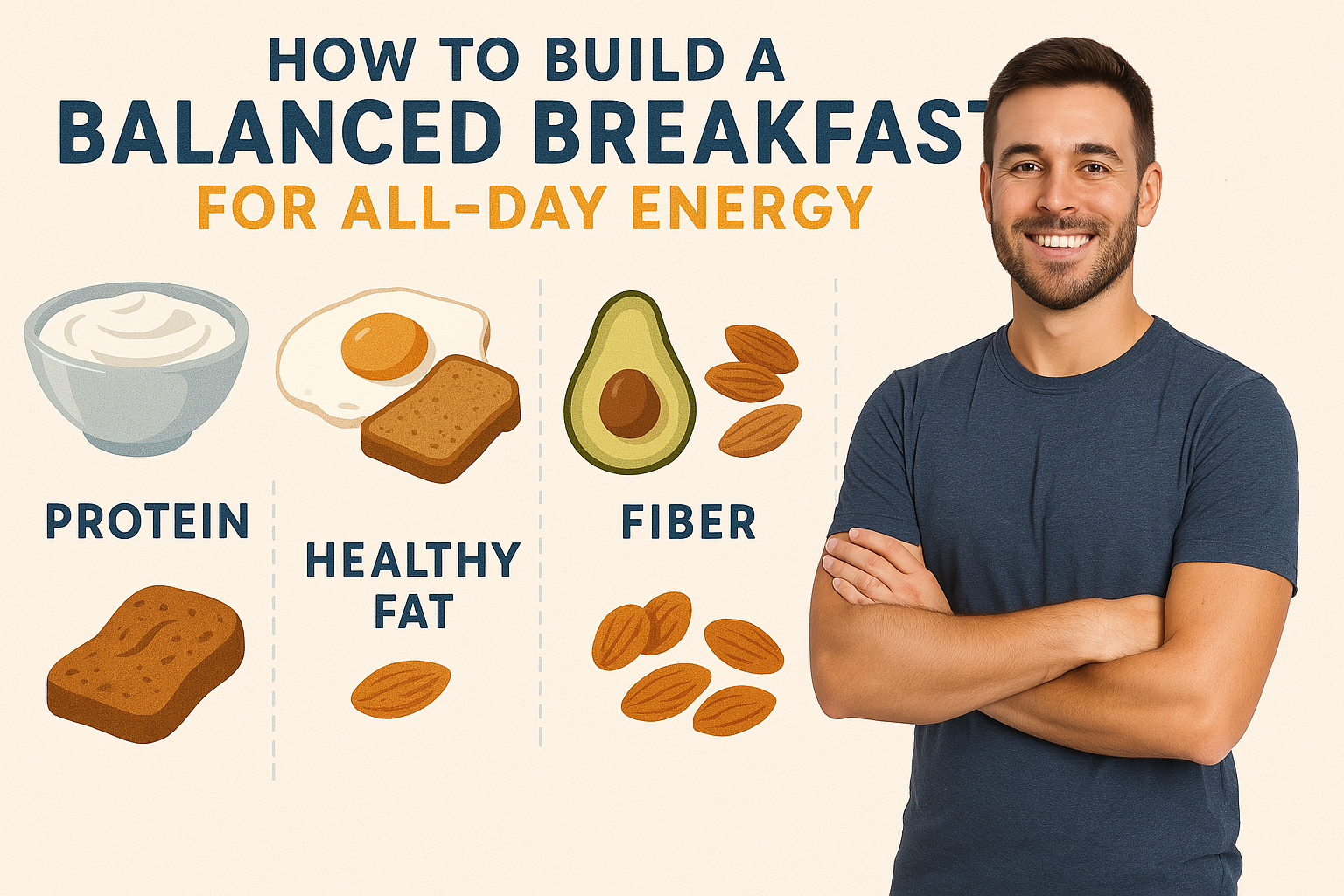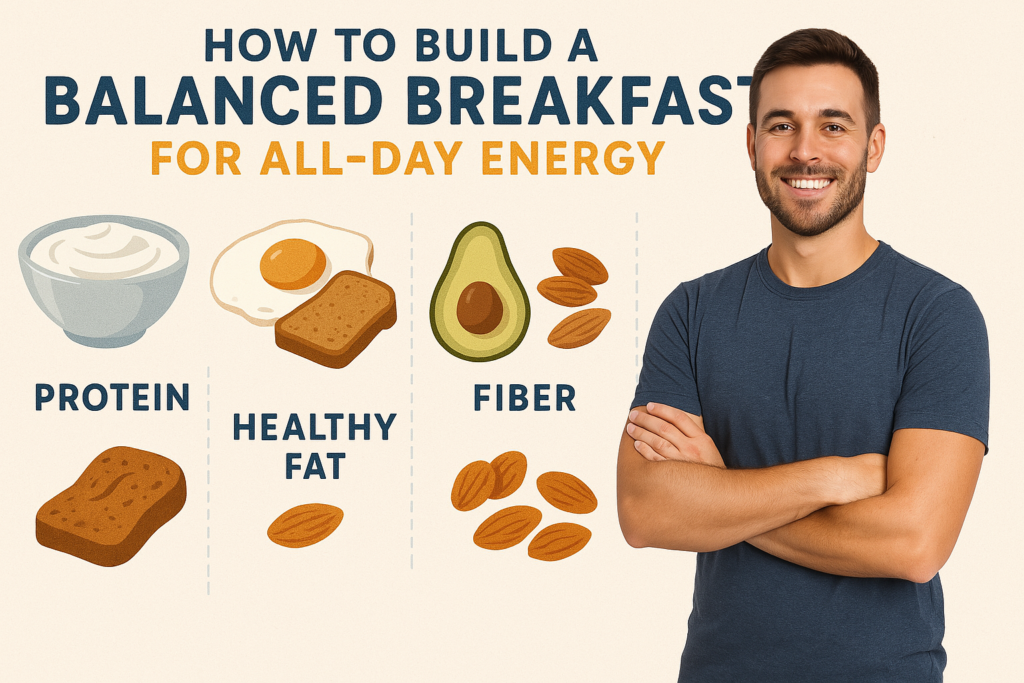
How to Build a Balanced Breakfast – You need to Know

A healthy balanced breakfast, without a doubt, is more than just a morning ritual.
In fact, it fuels both your body and mind for the entire day.
When built correctly, this first meal can stabilize blood sugar and improve brain function.
Additionally, it helps prevent mid-morning energy crashes.
The Science Behind a Balanced Breakfast
Why Breakfast Matters Balanced Breakfast
To begin with, after a night of fasting, your body wakes up in a low-energy state.
As a result, blood glucose levels are at their lowest in the morning.
Therefore, skipping breakfast can trigger a rise in cortisol, the stress hormone.
This, in turn, increases both stress and hunger later in the day.
According to research, people who eat breakfast consistently have better memory.
Moreover, they tend to experience improved mood and metabolic health.
On the other hand, skipping breakfast often leads to fatigue and poor focus.
Consequently, it can result in overeating and reduced productivity.
How Breakfast Impacts Energy
Importantly, your energy throughout the day depends on stable blood sugar levels.
When you consume only refined carbs, your blood sugar spikes rapidly.
Then, unfortunately, it crashes just as fast, leaving you tired and irritable.
In contrast, a balanced breakfast digests slowly and fuels you steadily.
Thus, this steady energy improves concentration and reduces cravings.
At the same time, it supports better mood and overall wellness.
As a bonus, it may even help maintain a healthy weight.
Key Components of a Balanced Breakfast
Macronutrients: The Energy Trinity
To build a meal that sustains energy, you must combine the right macronutrients.
That means including carbohydrates, protein, and healthy fats on your plate.
Together, these three elements regulate blood sugar and promote fullness.
Complex Carbohydrates
First of all, carbohydrates are your body’s primary energy source.
However, it’s crucial to choose complex carbs rather than simple ones.
Since complex carbs digest slowly, they offer long-lasting energy.
For example, whole grains like oats and quinoa are excellent options.
Likewise, vegetables and fiber-rich fruits like apples provide steady fuel.
High-Quality Protein Balanced Breakfast
Next, protein plays a vital role in breakfast balance.
Not only does it stabilize blood sugar, but it also enhances satiety.
In addition, protein supports muscle repair and cognitive function.
So, try eggs, Greek yogurt, or even tofu for plant-based protein.
Alternatively, a scoop of protein powder in your smoothie works well too.
Healthy Fats
Furthermore, healthy fats slow digestion and boost nutrient absorption.
They are especially useful in supporting hormone health and brain performance.
For instance, avocados, nuts, and chia seeds are great choices.
Also, a drizzle of olive oil or coconut oil adds both taste and benefits.
Micronutrients and Hydration – Balanced Breakfast
Equally important are vitamins, minerals, and water intake.
These small nutrients play major roles in energy metabolism.
To support your day, add leafy greens or colorful vegetables to your meal.
Besides that, fruits rich in antioxidants like berries help fight fatigue.
Start your day with water or herbal tea to boost hydration early.
Structuring Your Breakfast for Maximum Energy
Build Around the “Power Plate” Principle
To create an ideal breakfast, consider the Power Plate model.
This method helps you visualize proper proportions on your plate.
Specifically, half the plate should include fruits and vegetables.
Then, one-quarter should feature complex carbohydrates.
Finally, the last quarter should contain lean protein and healthy fat.
Sample Balanced Breakfast Combinations
Classic and Quick Options
For a quick but healthy option, try oatmeal with chia seeds and berries.
Alternatively, spread avocado on whole grain toast with a poached egg.
Another option is Greek yogurt topped with granola and sliced bananas.
High-Protein Meals
If you need more protein, scrambled tofu with quinoa is a great pick.
Or, blend a smoothie with protein powder, spinach, and nut butter.
Boiled eggs paired with sweet potatoes and greens also satisfy well.
Low-Carb Alternatives
In case you follow a low-carb diet, avocado egg boats are ideal.
Similarly, cottage cheese bowls with veggies offer protein and fiber.
Chia pudding topped with walnuts and berries also fits the bill.
Timing and Mindful Eating-Balanced Breakfast
Eat Within the First 1–2 Hours of Waking
To maximize metabolism, it’s best to eat shortly after waking.
Ideally, you should aim to eat within the first two hours.
Otherwise, you may feel intense hunger later in the morning.
Consequently, skipping breakfast can lead to overeating at lunch.
Practice Mindful Eating
While rushing might be tempting, slowing down during meals helps digestion.
So, chew your food thoroughly and enjoy every bite.
Avoid screens and distractions so you stay connected to your hunger cues.
Because of this habit, you’ll likely eat less and feel more satisfied.
Common Breakfast Pitfalls to Avoid – Balanced Breakfast
High-Sugar Balanced Breakfast
Unfortunately, many popular breakfast options are sugar traps.
For example, cereals, pastries, and flavored yogurts contain added sugars.
Although they give a quick boost, they cause energy crashes later.
Instead, opt for whole foods with fiber and protein to avoid this issue.
Skipping Breakfast Altogether Balanced Breakfast
Sometimes, people skip breakfast to save time or cut calories.
However, this often leads to increased cravings and poor choices later.
Even a small, balanced meal can make a big difference.
Therefore, prep meals ahead to make mornings smoother.
Relying Only on Coffee
Although coffee boosts alertness, it lacks nutritional value.
For that reason, always pair it with a nutrient-rich breakfast.
Otherwise, caffeine might lead to jitters, fatigue, or hunger spikes.
Tailoring Breakfast to Your Lifestyle
For Busy Professionals
If mornings are rushed, overnight oats or smoothies are lifesavers.
Also, keep hard-boiled eggs or fruit ready for grab-and-go options.
Moreover, prepping breakfast the night before saves time and stress.
For Active Individuals Balanced Breakfast
If you exercise in the morning, your breakfast needs special attention.
Add protein to help with muscle repair after a workout.
Include carbs to restore glycogen and improve recovery.
Hydration is also key, so drink water or use electrolytes.
For Kids and Teens
For growing children, breakfast should be colorful and appealing.
Avoid sugary cereals and include whole grains and dairy.
Likewise, fruit and nut butters offer nutrients and lasting energy.
For Seniors
As people age, soft and easy-to-digest foods are helpful.
Choose options like oatmeal, yogurt, or soft fruits.
Include protein to support muscle health and fiber for digestion.
Optimizing Balanced Breakfast for Specific Goals

Weight Management
To support weight goals, emphasize high-protein and fiber-rich meals.
For example, eggs with vegetables or smoothies with flaxseeds work well.
These meals reduce hunger and limit unnecessary snacking.
Mental Focus
If focus is your goal, certain nutrients make a difference.
Choline from eggs and omega-3s from walnuts enhance brain power.
Additionally, polyphenols in berries improve mental clarity.
Blood Sugar Control
For balanced blood sugar, avoid refined carbs and added sugars.
Combine protein, fats, and fiber-rich carbs in every meal.
This approach helps prevent spikes and crashes in glucose levels.
Tips for Long-Term Balanced Breakfast Success
Meal Prep and Planning
To stay consistent, prep ingredients or full meals ahead of time.
Batch-cook oats or boil eggs on Sunday for the whole week.
Freeze smoothie packs for a quick morning fix.
Rotate and Experiment
To avoid boredom, keep changing your breakfast routine.
Try new grains, fruits, or spices regularly.
This not only adds excitement but ensures a variety of nutrients.
Listen to Your Body
Most importantly, stay in tune with how your body reacts.
If something leaves you sluggish or hungry, adjust your meals.
Not everyone thrives on the same foods, so find what works best.
Conclusion
In conclusion, breakfast is the foundation of a productive day.
With a balanced mix of macronutrients and hydration, you’ll feel energized.
Through thoughtful planning and mindful eating, mornings become powerful.
Start each day strong, and your body will thank you.






